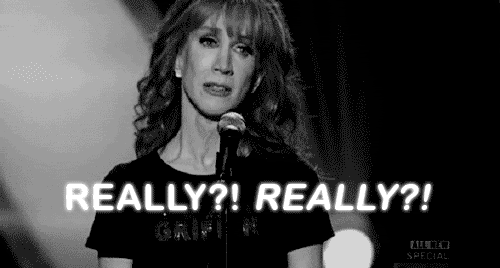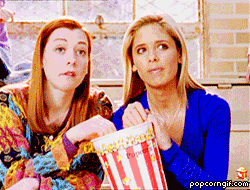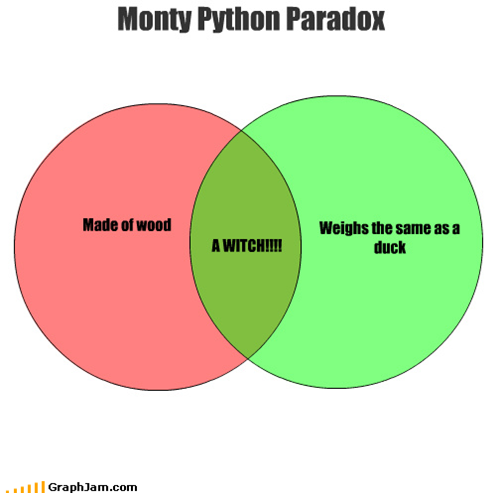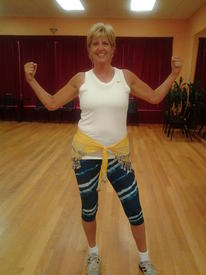'you're fat therefore you were eating too much food'... NO
Replies
-
I love the irony of you quoting "logic" in your OP and then using false logic.
At least you spelled "you're" correctly.0 -
False logic. Too much food does not mean that your piece of cake was too big; it means too many calories.
The volume of food you eat has nothing to do with the number of calories it contains.
Hmmm... this feels a bit like the lb of fat vs lb of muscle debate.
OP - Volume is implied!
You can have a cup of almonds for 700+ calories or you can have a cup of blueberries for 80 calories.
Volume isn't implied. There is no corellation between calories and volume. When people say too much food, they mean too many calories0 -
I *think* what she meant was bulk. Like, number of bites or actual mass of the food. It's easy to eat a relatively small mass of food and gain weight if that food is high in calories. But many people think that if you're fat you must be a glutton that's stuffing your face constantly all day, and that's just not true.0
-
I'm so sick of seeing this 'logic' splashed over the boards. I ate less when I was big than I do now. I just ate different, more calorific food. When people say they are struggling to get to calories it's sometimes because they are genuine about doing this and they have restricted themselves to lean meat, veges, and not much else, all really low fat and low cal, because that is what they heard for years and they don't know that there is another, more effective way.
People being sanctimonious and throwing about the 'you must know how to eat because you're fat' line is ridiculous. Everyones scenario is a little bit different and while the same solution (in variations) will work for everyone, NOT everyone is fat because they ate too much bulk of food, their balance was simply off. Or, like me, they had an accident and that, coupled with a thyroid problem and (at the time) ignorance of BMR led me to put on weight.
end rant
 0
0 -
 0
0 -
 0
0 -
Eat more to weigh less0
-
I *think* what she meant was bulk. Like, number of bites or actual mass of the food. It's easy to eat a relatively small mass of food and gain weight if that food is high in calories. But many people think that if you're fat you must be a glutton that's stuffing your face constantly all day, and that's just not true.
She did mean bulk.
Which is weird, because that's not what anybody else means.0 -
 0
0 -
 0
0 -
False logic. Too much food does not mean that your piece of cake was too big; it means too many calories.
The volume of food you eat has nothing to do with the number of calories it contains.
Hmmm... this feels a bit like the lb of fat vs lb of muscle debate.
OP - Volume is implied!
You can have a cup of almonds for 700+ calories or you can have a cup of blueberries for 80 calories.
Volume isn't implied. There is no corellation between calories and volume. When people say too much food, they mean too many calories
But a cup of blueberries has more water, and therefore, less mass by volume, than a cup of almonds, and likewise, less calories.
BTW shouldn't we be weighing these almonds and blueberries since they aren't actually liquids?0 -
In for the gifs.0
-
I, too, think the OP implied VOLUME - eating a large amount of 'food' does not necessarily automatically equal large amount of calories.
You can eat smaller VOLUME, and still consume a TON of calories. Milkshakes, an easy way to get in over 1000 calories in a glass - vs drinking water - same VOLUME - guaranteed if you have 3 milkshakes a day vs 3 large glasses of water, you're bound to gain weight, and that's just ONE example. Add in mayo laden, cheese laden, butter laden anything, and you've got calorie dense foods that pack on the pounds, with small volume.
Anyhow - we could use a thousand examples here, I get what the OP was implying, and agree 100%. I've eaten both ways, calorie dense, and non calorie dense, same amount of food by volume, and lost weight one way, gained it the other. Pretty simple if you ask me.0 -
When they mean too much, they probably mean caloric value. And literally that would mean "too much" for what one needs. Law of thermodynamics apply..................eat more than you burn and you store energy. This even happens with people who have hormone issues since hormones directly affect metabolism.I'm so sick of seeing this 'logic' splashed over the boards. I ate less when I was big than I do now. I just ate different, more calorific food. When people say they are struggling to get to calories it's sometimes because they are genuine about doing this and they have restricted themselves to lean meat, veges, and not much else, all really low fat and low cal, because that is what they heard for years and they don't know that there is another, more effective way.
People being sanctimonious and throwing about the 'you must know how to eat because you're fat' line is ridiculous. Everyones scenario is a little bit different and while the same solution (in variations) will work for everyone, NOT everyone is fat because they ate too much bulk of food, their balance was simply off. Or, like me, they had an accident and that, coupled with a thyroid problem and (at the time) ignorance of BMR led me to put on weight.
end rant
A.C.E. Certified Personal/Group FitnessTrainer
IDEA Fitness member
Kickboxing Certified Instructor
Been in fitness for 30 years and have studied kinesiology and nutrition0 -
um.
ok then.0 -
 0
0 -
:huh:0
-
I *think* what she meant was bulk. Like, number of bites or actual mass of the food. It's easy to eat a relatively small mass of food and gain weight if that food is high in calories. But many people think that if you're fat you must be a glutton that's stuffing your face constantly all day, and that's just not true.
She did mean bulk.
Which is weird, because that's not what anybody else means.
It is weird because I could eat three fast food meals today for under 2000 calories (I won't but I could). They would be relatively small, yes, but that's her whole argument - that she ate smaller amounts of high calorie food which made her fat. **** it, I don't think there's any "logic" as OP put it to be found here, I give up!0 -

 0
0 -
I, too, think the OP implied VOLUME - eating a large amount of 'food' does not necessarily automatically equal large amount of calories.
You can eat smaller VOLUME, and still consume a TON of calories. Milkshakes, an easy way to get in over 1000 calories in a glass - vs drinking water - same VOLUME - guaranteed if you have 3 milkshakes a day vs 3 large glasses of water, you're bound to gain weight, and that's just ONE example. Add in mayo laden, cheese laden, butter laden anything, and you've got calorie dense foods that pack on the pounds, with small volume.
Anyhow - we could use a thousand examples here, I get what the OP was implying, and agree 100%. I've eaten both ways, calorie dense, and non calorie dense, same amount of food by volume, and lost weight one way, gained it the other. Pretty simple if you ask me.
I think you missed my point. Yes, OP is talking about volume of food versus calorie density. My point is, just like with the lb of fat vs lb of muscle debate, when people tell her that she is fat because she ate too much, the volume of food is implied.0 -
I, too, think the OP implied VOLUME - eating a large amount of 'food' does not necessarily automatically equal large amount of calories.
You can eat smaller VOLUME, and still consume a TON of calories. Milkshakes, an easy way to get in over 1000 calories in a glass - vs drinking water - same VOLUME - guaranteed if you have 3 milkshakes a day vs 3 large glasses of water, you're bound to gain weight, and that's just ONE example. Add in mayo laden, cheese laden, butter laden anything, and you've got calorie dense foods that pack on the pounds, with small volume.
Anyhow - we could use a thousand examples here, I get what the OP was implying, and agree 100%. I've eaten both ways, calorie dense, and non calorie dense, same amount of food by volume, and lost weight one way, gained it the other. Pretty simple if you ask me.
I think you missed my point. Yes, OP is talking about volume of food versus calorie density. My point is, just like with the lb of fat vs lb of muscle debate, when people tell her that she is fat because she ate too much, the volume of food is implied.
No.
When people say she ate too much food, they're talking about any particular food. They're saying that, whatever type of food she eats, she eats too much of it.0 -
 0
0 -
False logic. Too much food does not mean that your piece of cake was too big; it means too many calories.
The volume of food you eat has nothing to do with the number of calories it contains.
Hmmm... this feels a bit like the lb of fat vs lb of muscle debate.
OP - Volume is implied!
You can have a cup of almonds for 700+ calories or you can have a cup of blueberries for 80 calories.
Volume isn't implied. There is no corellation between calories and volume. When people say too much food, they mean too many calories
But a cup of blueberries has more water, and therefore, less mass by volume, than a cup of almonds, and likewise, less calories.
BTW shouldn't we be weighing these almonds and blueberries since they aren't actually liquids?
Yes, but my point is that that correlation is simply coincidental. Whether you weigh it or not, the volume itself is not responsible for the number of calories, the caloric density is an independent property.0 -
False logic. Too much food does not mean that your piece of cake was too big; it means too many calories.
The volume of food you eat has nothing to do with the number of calories it contains.
Hmmm... this feels a bit like the lb of fat vs lb of muscle debate.
OP - Volume is implied!
You can have a cup of almonds for 700+ calories or you can have a cup of blueberries for 80 calories.
Volume isn't implied. There is no corellation between calories and volume. When people say too much food, they mean too many calories
But a cup of blueberries has more water, and therefore, less mass by volume, than a cup of almonds, and likewise, less calories.
BTW shouldn't we be weighing these almonds and blueberries since they aren't actually liquids? 0
0 -
What cracks me up is the number of responses to this post, when there hasn't been anymore by the OP. It's like she came in here, dropped an illogical bomb on everyone, then walked out.0
-
What cracks me up is the number of responses to this post, when there hasn't been anymore by the OP. It's like she came in here, dropped an illogical bomb on everyone, then walked out.
But those walking out calories will burn some of that weight off surely 0
0 -
If you were fat, you ate too much food.
that depends on what your definition of too is...0 -
Logic is dead wrong, as stated by just about everyone else. However, hypothyroidism can definitely lead to lethargy (i.e. no exercise because no energy) and weight gain, despite what you are eating. Your metabolism slows to a near halt and you will gain weight no matter what with hypothyroidism. If this condition is under control and you have no eating problems and exercise regularly, then you'll lose the weight again once hormone levels are normalized.0
-

this is sooo cute 0
0 -
 0
0
This discussion has been closed.
Categories
- All Categories
- 1.4M Health, Wellness and Goals
- 398.2K Introduce Yourself
- 44.7K Getting Started
- 261K Health and Weight Loss
- 176.4K Food and Nutrition
- 47.7K Recipes
- 233K Fitness and Exercise
- 462 Sleep, Mindfulness and Overall Wellness
- 6.5K Goal: Maintaining Weight
- 8.7K Goal: Gaining Weight and Body Building
- 153.5K Motivation and Support
- 8.4K Challenges
- 1.4K Debate Club
- 96.5K Chit-Chat
- 2.6K Fun and Games
- 4.8K MyFitnessPal Information
- 12 News and Announcements
- 21 MyFitnessPal Academy
- 1.6K Feature Suggestions and Ideas
- 3.2K MyFitnessPal Tech Support Questions
















